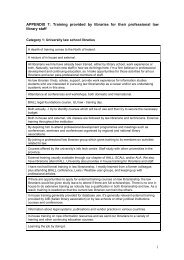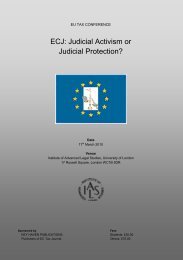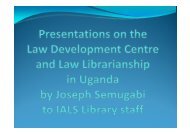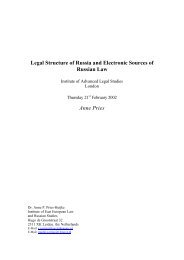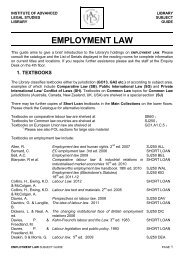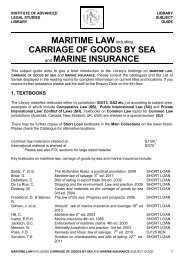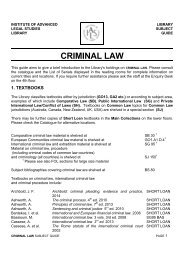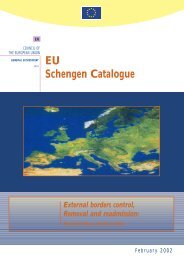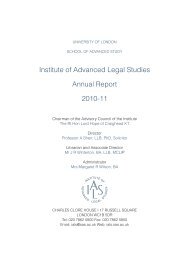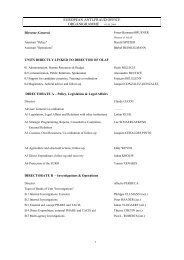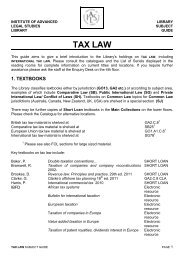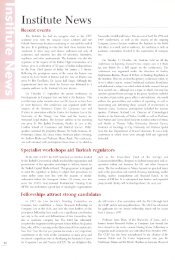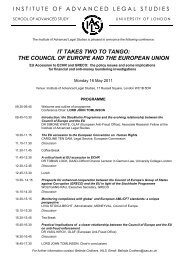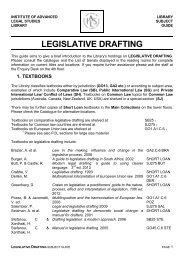a thesis - Institute of Advanced Legal Studies
a thesis - Institute of Advanced Legal Studies
a thesis - Institute of Advanced Legal Studies
Create successful ePaper yourself
Turn your PDF publications into a flip-book with our unique Google optimized e-Paper software.
72 EXPRESS TRUSTS.<br />
tory trust, and B. takes an estate for life merely. WJiite v. Carter<br />
(1766), 2 Eden, 365.<br />
10. A. devises land to trustees upon trust on B.'s attaining the<br />
age <strong>of</strong> twenty-one years or being married that they shall, as counsel<br />
shall advise, convey, settle and assure the same to B. for life, and<br />
after her death then on the heirs <strong>of</strong> her body lawfully issuing.<br />
This is an executory trust, and B. is entitled to an estate for life<br />
only, with remainder to her first and other sons in tail general.<br />
Bastard v. Proby (1788), 2 Cox, 6.<br />
11. A. by will gives the residue <strong>of</strong> his property to his executors<br />
in trust for B., adding, " my will is that he shall not be put into<br />
possession <strong>of</strong> any <strong>of</strong> my effects till he attains the age <strong>of</strong> twentyfour<br />
years, nor shall my executors (jive up their trust till a proper<br />
entail be made to the Jieir male by him. This is an executory trust,<br />
but, there being nothing to show that the words are not used in<br />
their technical sense, B. takes an estate tail. Blackburn v. Stables<br />
(1813), 2 Y. & B. 367.<br />
12. A. devises to B. all his real and personal estate upon trust<br />
that the same shall be settled by able counsel to go to and amongst<br />
his grandchildren <strong>of</strong> the male kind and their issue in tail male,<br />
remainder over. This is an executory trust, but, there being no<br />
evidence <strong>of</strong> a contrary intention, the grandchildren take estates tail.<br />
Marshall v. Bomfield (1817), 2 Maddock, 166.<br />
13. A. bequeaths jewels to B. " to go and be held as heirlooms<br />
by him, and by his eldest son on his decease, and to go and<br />
descend to the eldest son <strong>of</strong> such eldest son, and so on, to the<br />
eldest son <strong>of</strong> his descendants, as far as the rules <strong>of</strong> law or equity<br />
will permit. And I request B. to do all in his power by will or<br />
otherwise to give effect to this my tcis/i." This is an executory trust<br />
(p. 545), and B. takes only a life interest, and the jewels must be<br />
settled on B. for life, remainder to his eldest son for life, remainder<br />
to the eldest son <strong>of</strong> such eldest son, to be vested at twenty-one.<br />
Shelley v. Shelley (1868), L. B. 6 Eq. 540.<br />
[Note.—Having regard to the decisions as to precatory trusts,<br />
supra, pp. 37—41, and especially to the case <strong>of</strong> Hill v. Hill (1897,<br />
1 Q,. B. 483), this might now not be regarded as a trust at all.]<br />
14. A. devises land on trust to convey, assign and assure it to B.



